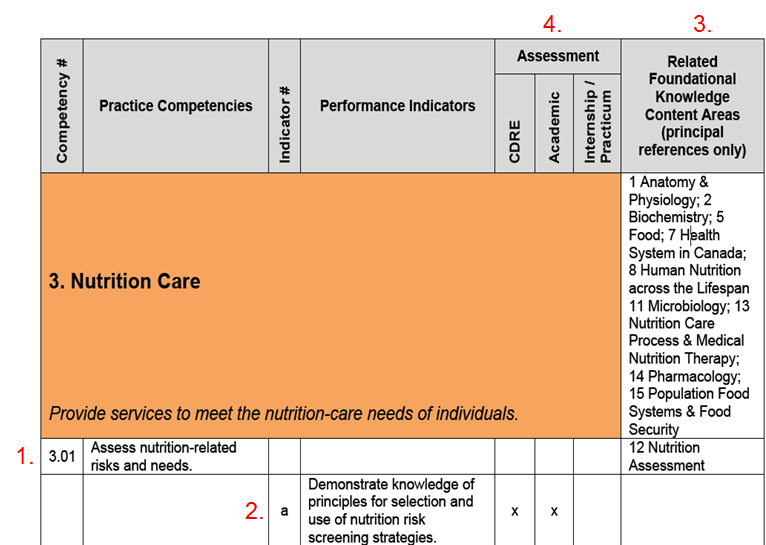The ICDEP describe the minimum level of knowledge, skills, attitudes and judgement expected of all dietitians at the point of entry into the profession in Canada to practice safely, effectively, and ethically.
The ICDEP include:
1. Competencies
Competencies are job tasks expected of a dietitian. There are competencies related to the three main areas of nutrition practice: Nutrition Care, Population and Public Health, and Management (including food service management). There are also competencies related to Professional Practice, and Communication and Collaboration, which span across all three areas of practice.
2. Performance Indicators
Each competency is made up of a series of performance indicators, which are assessed to determine if an individual is able to perform the competencies at the required level of proficiency. The performance indicators can be thought of as the “steps” that need to be completed to demonstrate the competency.
In total, there are 30 Competencies and 280 Performance Indicators. They are distributed as follows:
Nutrition Care
# of Competencies = 4
# of Performance Indicators = 68
Population and Public Health
# of Competencies = 4
# of Performance Indicators = 28
Management
# of Competencies = 3
# of Performance Indicators = 55
Communication and Collaboration
# of Competencies = 6
# of Performance Indicators = 55
Professional Practice
# of Competencies = 13
# of Performance Indicators = 74
3. Foundational Knowledge Content Areas
This is the body of knowledge that is required for dietetics practice.
The diagram below describes the different components of the ICDEP document, including where you can find the competencies, performance indicators and foundational knowledge content areas:

1. The Competencies are the job tasks expected of a dietitian.
2. The Performance Indicators (PIs) are ways someone would show that he or she is capable of doing the job task (competency). There are a number of PIs associated with a particular competency.
It is the consistent demonstration of the set of PIs for a particular competency that gives confidence that someone will be safe, effective and ethical in their practice. Each PI has a number associated with it - for example, in the diagram, the PI would be identified as 3.01a.
3. The Foundational Knowledge Content Areas relate to learning gained through academic course work. When integrated and combined, this body of knowledge is unique to a dietitian and relates to whether someone may be able to perform the job task of a dietitian at entry-level proficiency.
4. The Assessment columns indicate where each Performance Indicator (PI) is required to be assessed at a minimum.
- The Academic column lists PIs that are assessed through university-based coursework.
- The Internship/Practicum column lists PIs that are assessed through supervised practical training in dietetics.
- The CDRE column lists the PIs that are assessed in the national licensure exam for dietitians in Canada (called the Canadian Dietetic Registration Examination or CDRE).
All PIs are assessed by a combination of academic and internship/practicum experience. The CDRE assesses a selection of PIs to confirm competency.